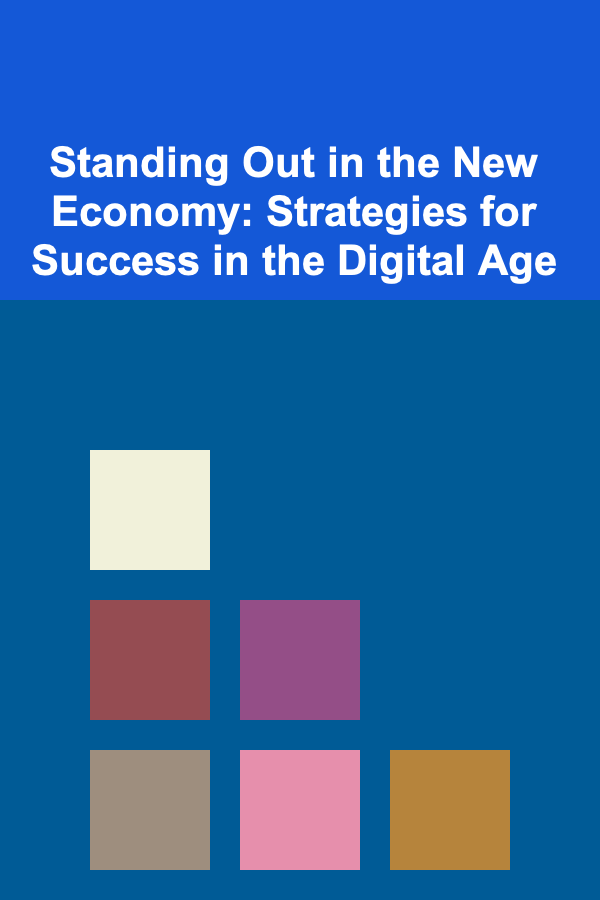
Standing Out in the New Economy: Strategies for Success in the Digital Age
ebook include PDF & Audio bundle (Micro Guide)
$12.99$9.99
Limited Time Offer! Order within the next:

In today's rapidly evolving landscape, standing out in the digital age requires more than just technical proficiency or professional experience. The new economy is driven by technological advances, globalization, and changing consumer behavior, all of which are reshaping how businesses operate and how individuals succeed. To thrive in this environment, you must adapt to the evolving needs of the marketplace, leverage digital tools effectively, and embrace a mindset of continuous learning and innovation.
This guide provides actionable strategies to help you navigate the digital age and differentiate yourself in an increasingly competitive economy. From embracing new technologies to cultivating essential soft skills, here are the key steps to standing out in the new economy.
Embrace the Digital Transformation
The digital revolution is here, and it's transforming nearly every aspect of the economy. To stand out, you need to embrace digital tools, platforms, and technologies that are reshaping industries across the board.
1.1 Master the Key Digital Skills
In the digital age, technical proficiency is no longer optional. Whether you work in finance, healthcare, marketing, or education, having a solid understanding of key digital skills can give you a competitive edge. Here are some critical areas to focus on:
- Data Literacy: Understanding how to analyze and interpret data is crucial. Learn how to work with data analytics tools like Excel, Tableau, and Power BI. Familiarize yourself with key data concepts such as data visualization, statistical analysis, and predictive modeling.
- Coding and Automation: While you don't need to be a professional developer, understanding the basics of coding (e.g., Python, JavaScript) and automation tools (e.g., Zapier, Power Automate) can greatly enhance your productivity and problem-solving abilities.
- Digital Marketing: As more businesses shift to online platforms, understanding the principles of digital marketing---SEO, social media marketing, content marketing, and paid ads---will help you leverage online tools to reach new audiences.
- Cybersecurity: With increasing digitalization comes the need for better security. Knowing the basics of cybersecurity and how to protect data online is increasingly vital.
1.2 Adopt the Latest Technologies
The digital landscape is constantly evolving. Staying up to date with the latest technologies not only makes you more competitive but also positions you as an innovator within your industry. Some technologies you should be aware of include:
- Artificial Intelligence and Machine Learning: These technologies are transforming industries such as finance, healthcare, and marketing. Gaining a basic understanding of AI, machine learning algorithms, and their applications will help you stay ahead of the curve.
- Blockchain and Cryptocurrencies: Blockchain technology has applications far beyond cryptocurrencies, including supply chain management, digital identity, and secure transactions. Understanding the principles of blockchain could open new career opportunities.
- Cloud Computing: Cloud platforms like AWS, Microsoft Azure, and Google Cloud are becoming central to business operations. Understanding how cloud computing works, including SaaS (Software as a Service), PaaS (Platform as a Service), and IaaS (Infrastructure as a Service), will set you apart in the job market.
- Virtual and Augmented Reality: VR and AR are making waves in sectors such as education, healthcare, and entertainment. Knowing how these technologies function and their potential applications could put you at the forefront of innovation.
1.3 Adapt to Remote and Hybrid Work Models
The shift to remote and hybrid work models is one of the most significant changes in the new economy. To stand out, you must be able to work effectively in a virtual environment, maintain productivity without direct supervision, and communicate effectively across digital platforms.
- Master Remote Collaboration Tools: Familiarize yourself with collaboration tools such as Slack, Zoom, Microsoft Teams, and Google Workspace. These tools are essential for remote team communication, project management, and document sharing.
- Time Management and Self-Discipline: Remote work requires a high level of self-discipline. Learn to manage your time effectively by using tools like Trello, Asana, or Notion to stay organized and on task.
- Build a Personal Brand: In a remote world, visibility is key. Cultivate your online presence through platforms like LinkedIn, personal blogs, or social media to establish your expertise and network with professionals in your field.
Cultivate Soft Skills for the Digital Age
While technical skills are important, soft skills are equally critical to success in the new economy. The ability to communicate effectively, work collaboratively, and adapt to changing circumstances will determine whether you thrive or struggle in the digital age.
2.1 Enhance Your Communication Skills
Effective communication is at the heart of success in a digital economy, especially in virtual and remote environments. Whether you're interacting with colleagues, clients, or stakeholders, you need to communicate clearly and persuasively.
- Clear Writing: Digital communication often takes place through emails, reports, and online messages. Being able to write clearly, concisely, and persuasively will help you stand out in a crowded digital space.
- Virtual Presentation Skills: With remote work and virtual meetings becoming the norm, it's important to develop strong virtual presentation skills. Learn to engage your audience, present complex information in an accessible way, and use visual aids effectively to enhance your message.
- Active Listening: Active listening---paying close attention to what others say and asking thoughtful follow-up questions---is a skill that can improve collaboration and lead to better decision-making in any environment, especially in digital communication.
2.2 Cultivate Emotional Intelligence (EQ)
Emotional intelligence---the ability to recognize and manage your emotions, as well as understand the emotions of others---is crucial in the digital age. High EQ can help you navigate the complexities of remote work, collaborate effectively, and lead teams in an era of constant change.
- Self-awareness: Understand your strengths and weaknesses, as well as your emotional triggers. This helps you manage stress, remain calm under pressure, and work more effectively with others.
- Empathy: In a digital world where face-to-face interactions are limited, empathy is key to building strong relationships. By understanding and empathizing with others' perspectives, you can foster better communication, resolve conflicts, and build trust.
2.3 Adaptability and Continuous Learning
The digital age is characterized by rapid change. Technologies evolve, business models shift, and industries transform. To succeed, you need to be adaptable and willing to continuously learn.
- Growth Mindset: Cultivate a mindset of continuous learning. Embrace challenges as opportunities to grow, seek feedback regularly, and be open to new ideas.
- Online Learning: The digital world offers endless opportunities for skill development through online courses, webinars, and tutorials. Platforms like Coursera, LinkedIn Learning, and Udemy provide a wide range of educational resources that can help you keep your skills up to date.
- Networking: In a digital economy, networking is not limited to in-person events. Use platforms like LinkedIn, Twitter, and specialized online communities to connect with industry experts, participate in discussions, and learn about emerging trends.
Leverage Personal Branding and Thought Leadership
In the new economy, your personal brand is an invaluable asset. By developing a strong online presence and establishing yourself as a thought leader in your industry, you can create opportunities for career advancement and business growth.
3.1 Build an Online Presence
A strong online presence helps you stand out and demonstrates your expertise. Here are some strategies to enhance your digital footprint:
- Professional Social Media: Use LinkedIn to showcase your skills, share insights, and build connections with industry professionals. Regularly post updates, articles, or comment on relevant content to stay visible.
- Personal Website or Blog: A personal website or blog can serve as a portfolio for your work, thoughts, and accomplishments. It's a powerful tool for showcasing your expertise and interests in a way that resonates with potential clients, employers, or collaborators.
- Podcasting or Video Content: Sharing your expertise through podcasts or video content can elevate your brand. Platforms like YouTube, Instagram, and TikTok provide a way to reach new audiences and establish yourself as a thought leader.
3.2 Establish Yourself as a Thought Leader
Becoming a thought leader involves consistently contributing valuable insights to your field and being recognized for your expertise. Here's how to do it:
- Write Articles and Blog Posts: Share your insights and knowledge on industry trends, challenges, and innovations through written content. Publishing on your blog, LinkedIn, or industry websites can build your reputation as a thought leader.
- Speak at Conferences or Webinars: Look for speaking opportunities at industry events, webinars, or podcasts. Speaking engagements help you gain visibility, showcase your expertise, and connect with other professionals.
- Collaborate with Others: Collaborate with other thought leaders, whether through joint articles, interviews, or projects. This can help expand your reach and further establish you as an expert in your field.
Foster Innovation and Entrepreneurship
The new economy is driven by innovation, and businesses that thrive are those that continuously adapt and embrace change. Whether you're working within an organization or pursuing your own entrepreneurial ventures, fostering a culture of innovation can help you stay ahead of the competition.
4.1 Encourage Creative Problem-Solving
Innovation begins with creative problem-solving. Encourage a mindset of experimentation, and don't be afraid to challenge the status quo. Whether in a corporate environment or as a solo entrepreneur, think outside the box to solve problems, create new products or services, and improve existing processes.
4.2 Identify New Market Opportunities
The digital age opens up countless new market opportunities. Whether it's tapping into emerging technologies, reaching underserved customer segments, or adapting to new consumer trends, staying alert to opportunities and being willing to pivot when needed is key to success.
4.3 Leverage Digital Tools for Innovation
Use digital tools to streamline operations, increase productivity, and innovate within your field. Whether it's using AI for customer service, leveraging big data for market analysis, or employing cloud-based project management tools to boost efficiency, innovation is often driven by smart use of technology.
Conclusion
Standing out in the new economy requires a combination of digital expertise, soft skills, personal branding, and a willingness to embrace change. The key to success is continuous adaptation---whether that means staying ahead of technological trends, cultivating your communication skills, or positioning yourself as a thought leader in your field. By following these strategies, you can thrive in the digital age and create lasting value in an ever-changing world.
Reading More From Our Other Websites
- [Horseback Riding Tip 101] Safety in Sync: Tips for Riding Side-by-Side with Your Riding Partner
- [Gardening 101] How to Create a Tranquil Japanese Garden in Your Backyard
- [Organization Tip 101] How to Sort and Store Different Types of Craft Materials
- [Organization Tip 101] Design Tips for Incorporating LED Recessed Lighting into Your Home's Layout
- [Tiny Home Living Tip 101] Best Space‑Saving Furniture Ideas for Multi‑Functional Tiny Living
- [Organization Tip 101] How to Use Labels and Tags for Efficient Organization
- [Hiking with Kids Tip 101] A Parent's Guide to Safe and Fun Hikes for Kids
- [Organization Tip 101] How to Create a Timeline of Your Life for Your Capsule
- [Weaving Tip 101] Stitching Up a New Skill Set: How the Art of Weaving Boosts Personal Growth
- [Home Party Planning 101] How to Create a DIY Photo Booth for Your Party

How to Create a Checklist for Managing the Home Inspection Process
Read More
How to Organize Your Music Room for Maximum Creativity
Read More
How To Play Board Games on Digital Platforms
Read More
How to Set and Achieve Long-Term Financial Goals
Read More
How to Stage Your Home with Minimalist Design Principles
Read More
Smart Saving for Retirement Strategies to Maximize Your Nest Egg
Read MoreOther Products

How to Create a Checklist for Managing the Home Inspection Process
Read More
How to Organize Your Music Room for Maximum Creativity
Read More
How To Play Board Games on Digital Platforms
Read More
How to Set and Achieve Long-Term Financial Goals
Read More
How to Stage Your Home with Minimalist Design Principles
Read More